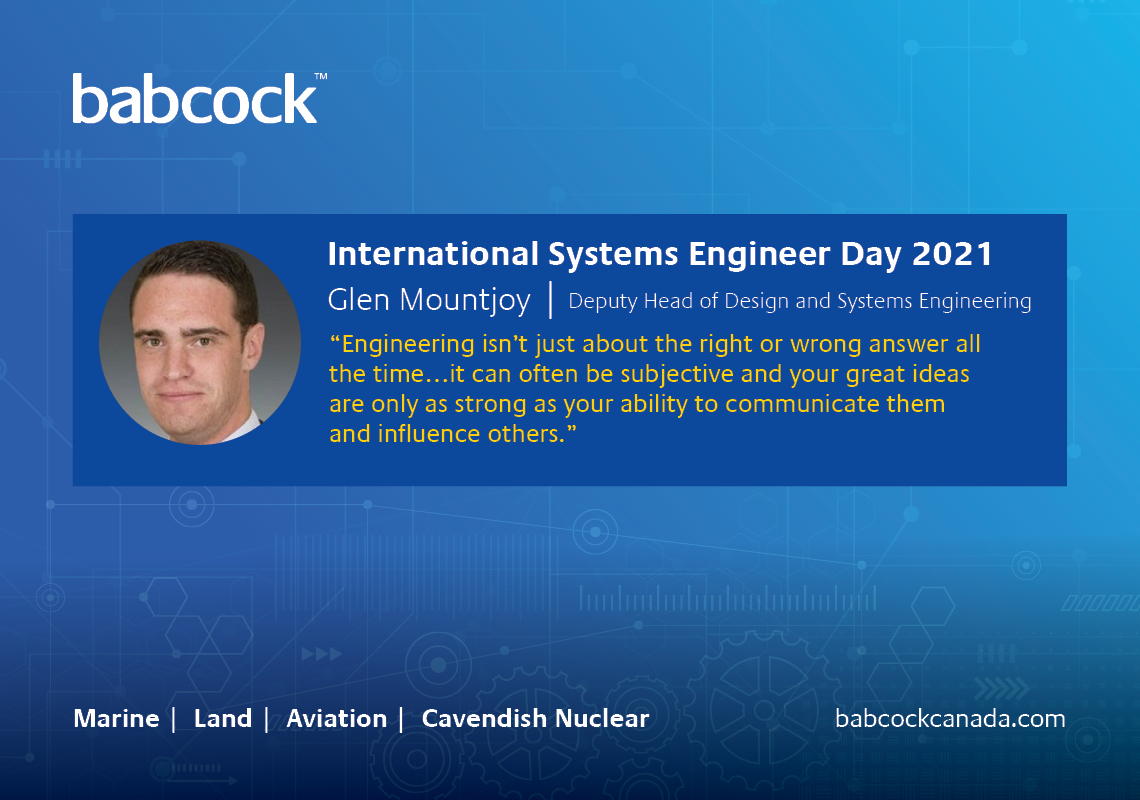
International Systems Engineer Day 2021
November 26th marks International Systems Engineer Day, these professionals thrive on using their technical expertise and passion for technology to design and build innovative systems to meet business needs.
As a recognized leader in the delivery of engineering support solutions in Canada and around the globe, Babcock is proud to be celebrating this day by highlighting one of our own talented Systems Engineers.
We sat down with Glen Mountjoy, Deputy Head of Design and Systems Engineering at Babcock Canada, to discuss his journey as a Systems Engineer.
Q. Can you please describe your role within Babcock?
GM: I am currently the Deputy Head of Design and Systems Engineering. I support the Head of Design and Systems Engineering in strategic direction and implementation while also managing a team of talented engineers and technologists in the delivery of technically complex design and integration projects.
Q. What is your academic and professional background?
GM: I obtained a Bachelors of Engineering degree in Mechanical Engineering from the University of Swansea and a Master of Science degree in Explosive Ordnance Engineering from Cranfield University. I have been lucky to experience a diverse career working within the defense industry since graduation; primarily focusing on the land and marine sectors.
Q. What is systems engineering and what is something you wish people knew about systems engineering?
GM: I could look up and recite the definition from standards as engineers like to do but I will give my own interpretation; Systems Engineering to me is the methodical and disciplined approach considering the whole life cycle of a product or service, from the development of the initial requirements, through design, in-service operation and all the way through to disposal.
If I had to choose one thing that I wish people knew about Systems Engineering it would be how significantly it can, and does, impact some of the world’s most complex technical projects and achievements.
Q: What inspired you to pursue engineering?
GM: In hindsight, it feels like it was just natural to become an engineer and never really a conscious decision. My dad was an engineer in the Royal Air Force throughout my childhood and I think he played a huge part in me becoming an engineer.


Q. What is your favourite part of the job?
GM: I really enjoy fixing complicated problems. I always like when they are technical in nature but any complex problem is something I really enjoy. I don’t always feel that way when I’m in the middle of it but I get a real sense of satisfaction reflecting on it afterwards and Systems Engineering is a hugely useful tool when trying to solve these complex problems. I also really enjoy working with lots of very talented and intelligent people who challenge me; constantly learning from them keeps me in the job.
Q: What does a typical day on the job look like for you?
GM: It varies quite a lot; some days I am supporting staff on a specific technical problem and other days I am focusing on strategy or improvement initiatives. No day is the same, which is what I like about the job. In general, I am a very passionate developer of people and probably spend a lot of my time with this at the front of my mind.
Q: What is your favourite part about working at Babcock?
GM: I’ve worked for a few different companies during my career and Babcock has struck the best balance for me. I have had opportunities for career progression and development but most importantly I work with a lot of really good people.
Q: What is the hardest challenge you have had to overcome during your career as an engineer?
GM: There have been many technical challenges, staring at calculations or code for hours wondering why I can’t get it to work, but the most significant challenge was learning that engineering isn’t just about the right or wrong answer all the time. There is more to it than just producing the correct number from a calculation. It can often be subjective and your great ideas are only as strong as your ability to communicate them and influence others. Adjusting this point of view after the academic portion of my career took some time.
Q. What is your biggest piece of advice for someone interested in pursuing a career in engineering?
GM: Number one is always do something that interests you! If you are interested in the work, you will excel at it. This does not need to be a fixed decision after leaving university or college; this can also change with time and its perfectly fine keep re-evaluating and changing your career direction. Also, learn about Systems Engineering! It’s a great skill set to have for a huge variety of complex problem solving.


